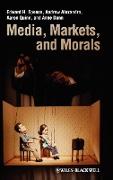Media, Markets, and Morals
BücherAngebote / Angebote:
The primary aim of the book is to explore and critically analyse and evaluate the ways in which the business of running large national and international media organisations in a free market economy affects, for better or worse, the integrity of the communication of information to the public. Insofar as information can be defined as "instructive knowledge" which must meet the traditional conditions of truth, justification and belief, the selling of information as another consumer product on the market may in some circumstances be both epistemologically and ethically problematic.
One of the main objectives of the book is to enquire into and analyse how and in what ways, if at all, the commercial and market interests of media organisations, especially as concerns news, may be undermining and in some instances corrupting both the process and the product of the communication of information to the public.
Some of the factors that will be investigated as possibly affecting the integrity of information communicated to the public by the media are convergence of the mediums of communication and the related issue of cross-media ownership, concentration of media ownership in the hands of a few powerful moguls, such as for example, Rupert Murdoch and Berlusconi, and the perceived 'unholy' alliance between journalism on the one hand and advertising and public relations on the other.
A close conceptual analysis of the notions of information and persuasion will be conducted to determine some of the theoretical and practical inherent inconsistencies that may underlie those two concepts and how those inconsistencies are manifested in media practice. Moreover, the book will investigate how these inherent inconsistencies when allowed to covertly undermine the integrity of media communication may constitute the corruption of communication. Infomercials and advertorials, product placements within news content may count as instances of such corruption.
Another objective of the book is to enquire into how, if at all, the aims and methods of business markets generally and media markets specifically can be reconciled with the media's aims and methods of communicating information on matters of public interest. Can the fourth estate be trusted to tell people the truth all the time or even some of the time? Should the public adopt a more sceptical attitude towards the media?
Finally another objective is to examine the concept and practice of self-regulation and whether it provides effective ethical if not legal regulation over the media. If the market constrains on the media are such that the media's ability to communicate information to the public comes under question, then more regulation of the media may be required. Opposed to that suggestion, considerations of censorship come into play. Theoretically, however, insofar as the media's freedom of communication of information to the public is based on the public's right to receive such information, then the media's freedom is constrained and overridden by the public interest. And the argument can be put forward that the public interest opposes information that is tainted by commercial and other interests that are not in the public interest with regard to an informed citizenry.
The book will include relevant cases in each chapter that will illustrate and contextualise the issues examined within a practical and professional setting.
Additionally, the book will, in some of the chapters, include interviews with leading media practitioners that will elicit their views on the issues examined.
Lieferbar in ca. 10-20 Arbeitstagen




